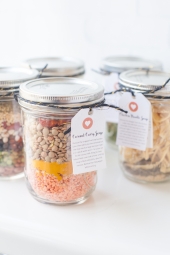
 3
3




 2
2




A build too cool to miss:Mike's GreenhouseA great example:Joseph's Garden
All the soil info you'll ever need:
Redhawk's excellent soil-building series









Trace Oswald wrote:Overnight oats are delicious.
 6
6




Scott Foster wrote:It reduces pack weight and the hassle of cleaning up. Cold soaking may be a good method of eating in an SHTF situation, especially if you live in a highly urban area or if you're bugging out.
Pecan Media: food forestry and forest garden ebooks
Now available: The Native Persimmon (centennial edition)




 2
2




Scott Foster wrote:
Trace Oswald wrote:Overnight oats are delicious.
Happy Freitag, Trace. What are overnight oats and how do you prepare them?
Can you think of anything else you can soak and eat without cooking?
A build too cool to miss:Mike's GreenhouseA great example:Joseph's Garden
All the soil info you'll ever need:
Redhawk's excellent soil-building series





 4
4




"We're all just walking each other home." -Ram Dass
"Be a lamp, or a lifeboat, or a ladder."-Rumi
"It's all one song!" -Neil Young
 1
1




Invasive plants are Earth's way of insisting we notice her medicines. Stephen Herrod Buhner
Everyone learns what works by learning what doesn't work. Stephen Herrod Buhner




Scott Foster wrote:
If you are on the move you can use a plastic peanut butter jar to prep your food by filling it with dehydrated beans and rice, filling with water and letting sit for an hour.
Building regenerative Christian villages @ https://jesusvillage.org/
100+ Homesteading Software Tools @ https://homestead.tools/
 3
3




T Simpson wrote:I'm not familiar with the term "cold soaking" ... I'm guessing it doesn't mean soaking in the bath to force a metabolic state.
Scott Foster wrote:
If you are on the move you can use a plastic peanut butter jar to prep your food by filling it with dehydrated beans and rice, filling with water and letting sit for an hour.
This quote doesn't make sense to me wouldn't you be able to carry more food for less weight if you filled the container with dehydrated food instead of rehydrated mush? I guess it would save you from carrying a second container for overflow. Is that the point?
Why not just pack a normal can of baked beans?

"We're all just walking each other home." -Ram Dass
"Be a lamp, or a lifeboat, or a ladder."-Rumi
"It's all one song!" -Neil Young

|
And now this tiny ad wants to get married
Large Lot for Sale Inside an Established Permaculture Community — Bejuco, Costa Rica
https://permies.com/t/366607/Large-Lot-Sale-Established-Permaculture
|

